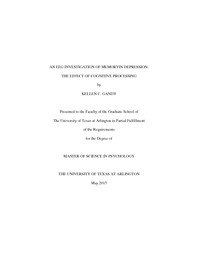
ATTENTION: The works hosted here are being migrated to a new repository that will consolidate resources, improve discoverability, and better show UTA's research impact on the global community. We will update authors as the migration progresses. Please see MavMatrix for more information.
Show simple item record
| dc.contributor.author | Gandy, Kellen C. | en_US |
| dc.date.accessioned | 2015-12-11T23:19:56Z | |
| dc.date.available | 2015-12-11T23:19:56Z | |
| dc.date.submitted | January 2015 | en_US |
| dc.identifier.other | DISS-13206 | en_US |
| dc.identifier.uri | http://hdl.handle.net/10106/25328 | |
| dc.description.abstract | Among clinical populations, depression patients tend to show impaired memory performance both in working memory and associative memory accompanied with disorders in neural activity in the DLPFC. However, it is unclear whether these deficits are related to selective deficits in different levels of processing, possibly due to a dysfunction of cognitive processing mediated by the prefrontal cortex. In order to investigate this possibility, the present study recruited individuals with high, moderate and low depression to examine the electrophysiological effects of cognitive processing in working memory and long-term memory with electroencephalography (EEG). As hypothesized, individuals with low depression showed a memorial benefit for deeper semantic processing whereas individuals with moderate and high depression did not. These findings provide supporting evidence of associative processing deficits among individuals with depression due to dysregulation of the frontal executive regions. | en_US |
| dc.description.sponsorship | Park, Heekyeong | en_US |
| dc.language.iso | en | en_US |
| dc.publisher | Psychology | en_US |
| dc.title | An EEG Investigation In Depression: The Effect Of Cognitive Processing | en_US |
| dc.type | M.S. | en_US |
| dc.contributor.committeeChair | Park, Heekyeong | en_US |
| dc.degree.department | Psychology | en_US |
| dc.degree.discipline | Psychology | en_US |
| dc.degree.grantor | University of Texas at Arlington | en_US |
| dc.degree.level | masters | en_US |
| dc.degree.name | M.S. | en_US |
Files in this item
- Name:
- Gandy_uta_2502M_13206.pdf
- Size:
- 1.055Mb
- Format:
- PDF
This item appears in the following Collection(s)
Show simple item record


